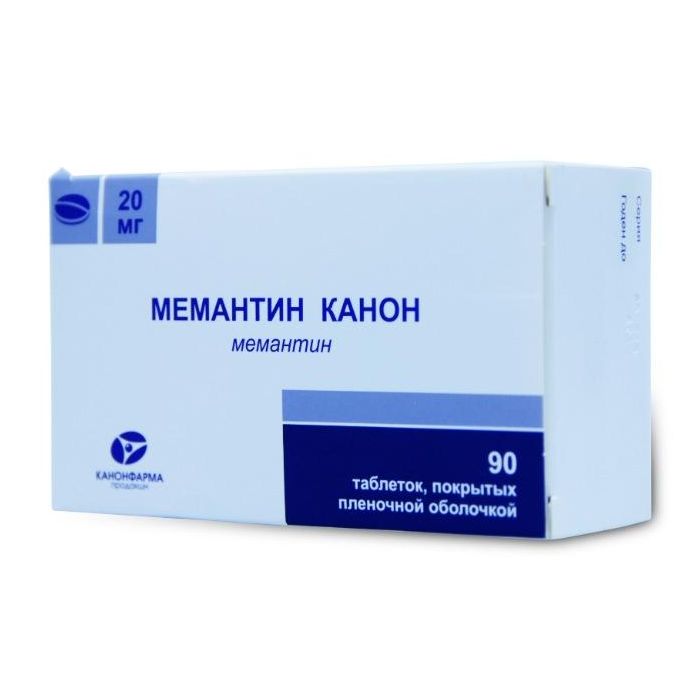Memantine | Memantine Canon tablets coated.pl.ob. 20 mg 90 pcs.
Special Price
$110.74
Regular Price
$120.00
In stock
SKU
BID538979
form of release Tablets, film-coated, white or almost white, round , biconvex in cross section almost white.
form of release Tablets, film-coated, white or almost white, round , biconvex in cross section almost white.
Pharmacological action
An agent for the treatment of dementia. It is a non-competitive antagonist of glutamate NMDA receptors (including in the substantia nigra), as a result of which it reduces the excessive stimulating effect of cortical glutamate neurons on the neostriatum, which develops against the background of insufficient secretion of dopamine. Reducing the intake of Ca2 + into neurons, reduces the possibility of their destruction.
It has a nootropic, cerebrovasodilating, antihypoxic and psychostimulating effect.
Improves impaired memory, increases the ability to concentrate, reduces fatigue and symptoms of depression, and reduces spasticity of skeletal muscles caused by diseases or brain damage.
Pharmacokinetics
After oral administration, it is rapidly and completely absorbed from the digestive tract. Cmax is reached after 3-8 hours. Binding to plasma proteins - 45%. When taken at a dose of 20 mg / day, Css from 70 to 150 ng / ml is achieved. Vd is 10 l / kg. Partially metabolized in the liver. It is excreted by the kidneys. T1 / 2 is - 60-100 h. The clearance is 170 ml / min / 1.73 m2.
Indications
Moderate to severe dementia in Alzheimer's disease.
Use during pregnancy and lactation
Use in pregnancy during I and three and three times during pregnancy and pregnancy
Contraindicated in pregnancy and lactation (breastfeeding).
Special instructions
Caution should be used in patients with epilepsy, renal failure, thyrotoxicosis, a history of seizures, hypertension, a history of myocardial infarction, heart failure.
In cases of impaired renal function, the dose of memantine should be reduced.
Composition
1 tab.
memantine hydrochloride 20 mg
Excipients: calcium hydrogen phosphate dihydrate - 55 mg, colloidal silicon dioxide - 5.2 mg, croscarmellose sodium - 7.5 mg, lactose monohydrate - 161.1 mg, magnesium stearate - 1.8 mg, povidone K30 - 9.4 mg.
Composition of the film coat: white opadray - 8 mg, incl. hypromellose (hydroxypropyl cellulose) - 2.7 mg, hyporolose (hydroxypropyl cellulose) - 2.7 mg, talc - 1.6 mg, titanium dioxide - 1 mg.
Dosing and Administration
When administered orally, the initial adult dose is 5 mg / day. In the future, the dose can be increased weekly by 5 mg. The average maintenance dose is 10-20 mg / day. The maximum dose is 20 mg / day.
Side effects
From the nervous system: dizziness, headache, drowsiness, impaired gait, confusion, hallucinations, convulsions, psychosis, increased irritability.
From the digestive system: constipation, vomiting, nausea, pancreatitis.
From the cardiovascular system: increased blood pressure, venous thrombosis, thromboembolism.
On the part of the body as a whole: fungal infections, general weakness, fatigue, allergic reactions.
Drug Interactions
With the simultaneous use of memantine, it can reduce the effects of barbiturates and antipsychotics.
The effects of baclofen and dantrolene may change under the influence of memantine (with this combination, dose adjustment may be required).
The effects of levodopa, dopamine receptor agonists and anticholinergics are enhanced with the use of NMDA receptor antagonists.
Due to Since memantine and amantadine are NMDA receptor antagonists, simultaneous use should be avoided due to the risk of toxic effects.
Combinations of memantine with ketamine, dextromethorphan, and phenytoin are also potentially toxic.
The same renal cationic system is used in the body to transport amantadine, cimetidine, ranitidine, quinidine, quinine, and nicotine, which can cause the interaction of these drugs with memantine, leading to an increase in its concentration in blood plasma.
With the simultaneous use of memantine may cause a decrease in the concentration of hydrochlorothiazide in serum.
When used simultaneously with warfarin and other indirect anticoagulants, careful monitoring of prothrombin time and INR is required.
Overdose
Symptoms
In cases of overdose at a dose of less than 140 mg once or in case of taking an unknown dose, adverse reactions from the central nervous system were observed in patients: confusion, hypersomnia, drowsiness, dizziness, agitation, aggression, hallucinations, impaired gait a also disorders of the cardiovascular system: vomiting, diarrhea.
With relatively large overdoses (200 mg once and 105 mg / day for 3 days), the following symptoms were noted: fatigue, weakness and / or diarrhea or no symptoms.
In the most severe case of overdose, the patient survived after taking a dose of 2000 mg of memantine, he had adverse reactions from the central nervous system (coma for 10 days, then diplopia and agitation). The patient received symptomatic treatment and plasmapheresis. The patient recovered without subsequent complications.
In another case of severe overdose, the patient survived and recovered after taking memantine at a dose of 400 mg once. The patient had adverse reactions from the central nervous system: anxiety, psychosis, visual hallucinations, lowering the threshold of convulsive readiness, drowsiness, stupor and loss of consciousness.
Treatment of
There is no specific antidote for memantine intoxication. Standard measures should be taken to remove the drug from the body: washing the stomach, taking activated charcoal, conducting forced diuresis, increasing the acidity of urine.
Storage conditions
At a temperature not exceeding 25 РC, in the manufacturer's packaging.
Keep out of the reach and sight of children.
Expiration
3 years.
Active ingredient
Memantine
Pharmacy terms
Prescription
PMA pills
Kanonfarma, Russia
Write Your Own Review

